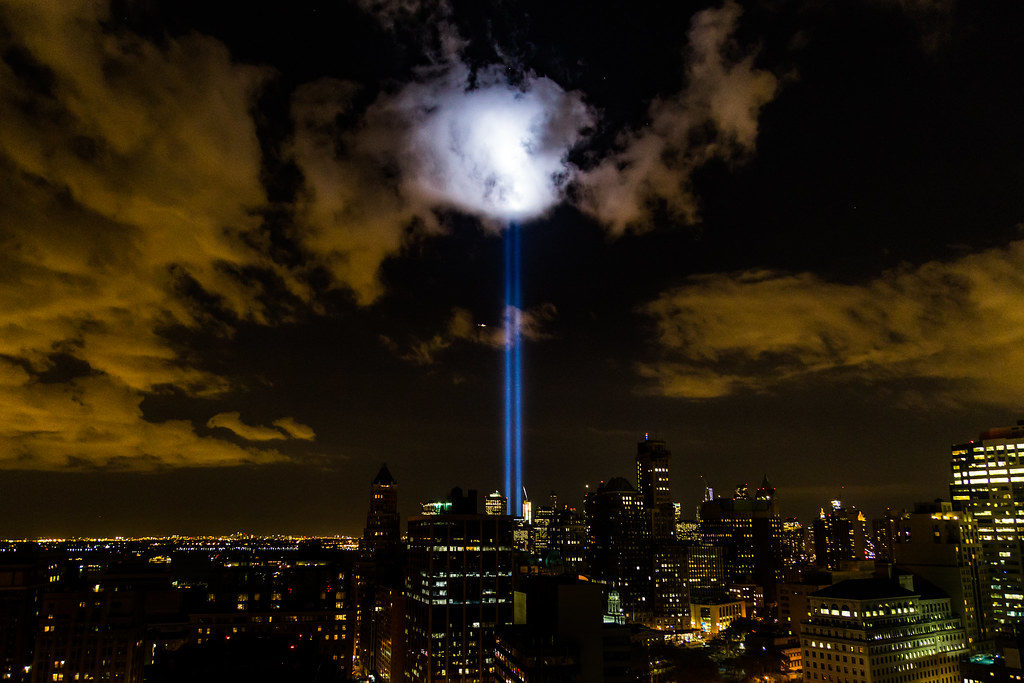“I’d given up offering advice. Even when people asked for it, they resented getting it.”
Ross Macdonald, The Galton Case
Terry Teachout on the arts in New York City
“I’d given up offering advice. Even when people asked for it, they resented getting it.”
Ross Macdonald, The Galton Case

• A few weeks after 9/11, I wrote an essay about where I was and what I did that day:
Read the whole thing here.“Get up, son,” my mother said, tapping softly on the door of the bedroom of my childhood home in Missouri. “An airplane hit the World Trade Center.” I came awake a split-second later, my head full of memories. For years, I had wondered when the long arm of terrorism would strike again at New York. I thought of a sunny Saturday morning back when I was living in an apartment house on a hill north of the city. A small earthquake shook the building as I lay sleeping, and the groaning of the old walls woke me. I heard a soft whir through the open window, the rustle of the leaves on the shaken trees. It’s a car bomb, I told myself, unable for one stunned moment to conceive of any other possibility.
All these thoughts flew through my mind in the time it took me to pull on my pants. Then I trotted to the living room, there to behold the coming of the new age….
• In 2001 I was writing a monthly “New York letter” for the arts section of the Washington Post, and three years later I posted several excerpts from the columns that I filed in the wake of 9/11, about which I had this to say:
To read those excerpts, go here.Could it be that I–we–were living more intensely in those days? It happens that my life was turned inside out in all sorts of ways in the immediate wake of 9/11, but no matter what fears I found myself facing, I almost always managed sooner or later to slip out of the fearful present and immerse myself in the blessed world of art, responding all the more passionately because of my renewed consciousness of life’s brevity. Strange that it so often takes a catastrophe, whether personal or public, to make you face a fact that was no less true on 9/10, or 9/12….

Because music is my first language, it stands to reason that for me, the memory of 9/11 should be inextricably caught up with the sound of music. I attended and wrote about many memorial concerts in the immediate wake of the tragedy, and I listened ceaselessly to all sorts of music throughout that terrible time, searching for a measure of comprehension and consolation and—once in a while—finding it.
In honor of that grave and reverend day, here are four pieces of variously solemn music that I love deeply:
• From Aaron Copland’s Twelve Poems of Emily Dickinson, “Sleep is supposed to be,” performed by Barbara Bonney and André Previn:
• The Third Courtly Dance from Benjamin Britten’s Gloriana, performed by Steuart Bedford and the London Symphony:
• The “Dead March” from Handel’s Saul, performed by Ivor Bolton and the Orchestra of the Age of Enlightenment:
• Hugo Wolf’s Anakreons Grab, performed by Dietrich Fischer-Dieskau and Gerald Moore. A translation of Goethe’s German text is here:“A fanatic is a man that does what he thinks th’ Lord wud do if He knew th’ facts iv th’ case.”
Finley Peter Dunne, Mr. Dooley’s Philosophy
From 2009:
Read the whole thing here.Patrick Kurp of Anecdotal Evidence and D.G. Myers of A Commonplace Blog are jointly conducting a serial symposium called “The Function of Book Blogging at the Present Time” whose participants have been invited to “speculate about the past, present, and future of this youngest of literary genres.” Even though I’m not strictly a book blogger, they asked me to join the fray anyway. Here’s my contribution….
“Going through life with a conscience is like driving your car with the brakes on.”
Budd Schulberg, What Makes Sammy Run?
Fats Domino sings and plays “Valley of Tears,” “It’s You I Love,” and “I’m Walkin’” on The Perry Como Show. He is introduced and interviewed by Como prior to the performances. This episode was originally telecast by NBC on May 25, 1957:
(This is the latest in a series of arts- and history-related videos that appear in this space each Monday, Wednesday, and Friday)
“A story really isn’t any good unless it successfully resists paraphrase.”
Flannery O’Connor, “On Her Own Work”
| M | T | W | T | F | S | S |
|---|---|---|---|---|---|---|
| 1 | 2 | 3 | 4 | 5 | ||
| 6 | 7 | 8 | 9 | 10 | 11 | 12 |
| 13 | 14 | 15 | 16 | 17 | 18 | 19 |
| 20 | 21 | 22 | 23 | 24 | 25 | 26 |
| 27 | 28 | 29 | 30 | 31 | ||
An ArtsJournal Blog